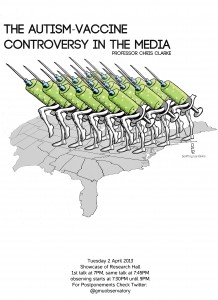********* April 16th Update *********
The Observing Session scheduled for Tuesday, April 16th has been postponed due to weather to Tuesday, April 23. More updates will be posted soon!
The next talk as part of George Mason Observatory’s ‘Evenings Under the Stars’ series (where you’ll also get to look at awesome galaxies, stars, planets and more through our 0.8 meter telescope!) will be ‘The Autism-Vaccine controversy in the Media‘ by Professor Chris Clarke. As always the event is free and everyone is invited (details about the event: Tuesday 2 April 2013: 1st talk at 7PM, same talk at 7:45PM, observing starts at 7:30PM until 9PM)! Just keep an eye out for weather – the event may be postponed or cancelled due to bad conditions – updates will be available here – Observatory Twitter
A little about the upcoming talk:
High profile risk controversies dominating today’s news often feature lively debates about scientific evidence – what “the data” suggest or refute. Research has focused on the challenges of communicating risk information via news media, including the concept of “false balance,” in which an issue supported by an overwhelming amount of evidence is presented alongside other perspectives with comparatively less/no support. Falsely balanced coverage may give the impression of scientific uncertainty about evidence for/against risk when, in fact, there is a high degree of scientific agreement.
This talk explores whether news stories can effectively provide context related to the state of evidence about controversial risk issues: in particular, the presence or lack of a scientific consensus. In effect, can the effects of false balance be overcome? Specifically, it explores the potential impact of context-based coverage on perceptions of certainty related to issue-related evidence and perceptions of a divided or united scientific community. As an example, the study uses a well-known health issue: the autism-vaccine controversy (AVC). Despite clear evidence of no link between autism and vaccines, beliefs about a link persist in the public arena. News media are argued to be partially culpable: focusing on claims both for and against a link may lead individuals to be more uncertain about an association and what scientists believe. Overall, the talk explores how media coverage of controversial issues informs public perceptions of those issues, and the risk communication implication of such insight.
And the speaker:
Chris Clarke, Ph.D., specializes in the strategic communication of health and environmental risk. He is particularly interested in how people become informed and inform others about risk issues; designing effective messages to communicate about risk; and how news media cover health and environmental risk. Case studies have included natural gas drilling, vaccination, bi
Chris holds a BS in health and environmental policy from Rutgers University and an MS and PH.D. in Communication from Cornell University. At GMU, he is also affiliated with the Center for Climate Change Communication.oterrorism, and infectious diseases.
Directions to GMU and Research Hall here: http://eagle.gmu.edu/map/fairfax.php Zoom in to find Research Hall next to engineering building and York River Rd



 Additional questions and feedback on the Observatory site can be addressed to:
Additional questions and feedback on the Observatory site can be addressed to: